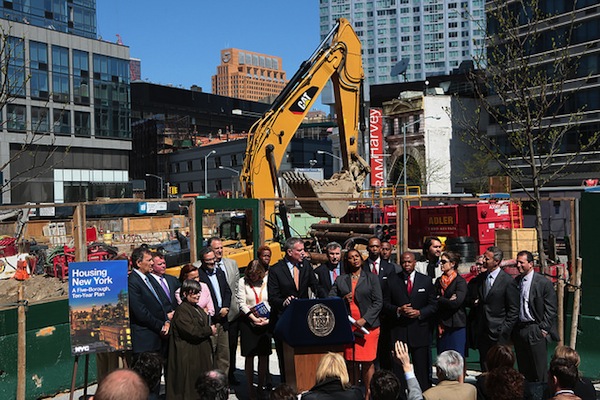
Photo by: Office of Mayor de Blasio
Getting from the housing plan (announced in May, above) to 200,000 units of production will require a more efficient system for vetting, financing and tracking affordable housing development projects.
The city’s housing department aims to boost the number of affordable housing starts by nearly 25 percent this fiscal year—the first full budget cycle with Mayor de Blasio in office—with a goal of 16,000 units.
That’s a lot of units. But that’s also a pace that would put the city far short of de Blasio’s target of 200,000 in 10 years.
“It will take time to ramp up,” Department of Housing Preservation and Development Commissioner Vicki Been told a lunchtime crowd Tuesday afternoon just blocks from City Hall. The plan is to keep accelerating “until we reach full production.”
But the de Blasio plan promises more than just new units; it also “recognizes the city needs to undertake comprehensive, community development,” Been said in her appearance before the annual luncheon of Women in Housing and Finance. “Our development efforts have to be guided by community engagement,” she added, and linked to investments investments in infrastructure, schools, parks and other public resources.
Meeting those twin challenges will take changes to the way HPD does business, which Been said are already under way.
The department has launched a new division of Neighborhood Strategies that encompasses three teams: planning, inclusionary housing and community partnerships (for those of you scoring your HPD organizational chart at home, the first two teams previously existed under the Office of Development). HPD staff are also meeting weekly with the Housing Development Corporation, NYCHA, City Planning and the Economic Development Corporation, and talking to state agencies—especially the MTA—to achieve better coordination.
Internally, HPD is tweaking its loan programs to lower upfront costs, standardize terms and get longer-term affordability out of each subsidy. There’s an effort to contain costs by giving developers better incentives to keep the price-tag low, and changes are also being made to how the agency scores proposals. HPD’s marketing department has been moved to a new division and is looking to improve the online housing lottery system, which right now works poorly for the disabled, English language learners and people whose income is seasonal. Meanwhile, better system for tracking turnover in affordable units—making sure in other words, that they remain the homes of people from the targeted income groups—is in the works.
Been says her agency is trying to get minority- and women-owned businesses a bigger piece of the affordable-housing action, including dedicating a development pipeline just for MWBE firms, creating a pool of low-cost financing for those entities and pre-qualifying more of them to jump into the bidding process.
“We’re also in the midst of a review of the regulatory and procedural costs we impost on development.” Been said. Design guidelines will be simplified, and there’s a push to rely more on self-certification, a system under which developers and architects vouch for the soundness of their own designs. Rather than the city checking every detail of each project, self-certification relies on the honor system and random audits.
“That’s not without controversy,” Been acknowledged. Self-certification by the Department of Buildings has sometimes been blamed for faulty construction. But HPD thinks robust auditing and enforcement will prevent abuse, and permit a system that saves time and money.
As with much of the de Blasio housing plan, details on some of these nuts-and-bolts reforms are still coming out. But the department says it’s already prepared to build at a quicker clip. “We’re ready, willing and able,” Been told the room of housing developers and financers, “to handle whatever production you bring in.”







